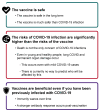Closing the Gap on COVID-19 Vaccinations in First Responders and Beyond: Increasing Trust
- PMID: 35055463
- PMCID: PMC8776085
- DOI: 10.3390/ijerph19020644
Closing the Gap on COVID-19 Vaccinations in First Responders and Beyond: Increasing Trust
Abstract
Although COVID-19 vaccines are widely available in the U.S. and much of the world, many have chosen to forgo this vaccination. Emergency medical services (EMS) professionals, despite their role on the frontlines and interactions with COVID-positive patients, are not immune to vaccine hesitancy. Via a survey conducted in April 2021, we investigated the extent to which first responders in the U.S. trusted various information sources to provide reliable information about COVID-19 vaccines. Those vaccinated generally trusted healthcare providers as a source of information, but unvaccinated first responders had fairly low trust in this information source-a group to which they, themselves, belong. Additionally, regardless of vaccination status, trust in all levels of government, employers, and their community as sources of information was low. Free-response explanations provided some context to these findings, such as preference for other COVID-19 management options, including drugs proven ineffective. A trusted source of COVID-19 vaccination information is not readily apparent. Individuals expressed a strong desire for the autonomy to make vaccination decisions for themselves, as opposed to mandates. Potential reasons for low trust, possible solutions to address them, generalizability to the broader public, and implications of low trust in official institutions are discussed.
Keywords: COVID-19; emergency medical services; frontline healthcare workers; medical mistrust; vaccine hesitancy.
Conflict of interest statement
The authors have declared no conflict of interest.
Figures













References
-
- Centers for Disease Control and Prevention Key Things to Know about COVID-19 Vaccines. [(accessed on 27 September 2021)];2021 Available online: https://www.cdc.gov/coronavirus/2019-ncov/vaccines/keythingstoknow.html?....
-
- World Health Organization COVID-19 Vaccines. 2021. [(accessed on 27 September 2021)]. Available online: https://www.who.int/emergencies/diseases/novel-coronavirus-2019/covid-19....
-
- Centers for Disease Control and Prevention COVID-19 Vaccinations in the United States. [(accessed on 20 September 2021)];2021 Available online: https://covid.cdc.gov/covid-data-tracker/#vaccinations_vacc-total-admin-....
-
- Mayo Clinic U.S. COVID-19 Vaccine Tracker: See Your State’s Progress. 2021. [(accessed on 27 September 2021)]. Available online: https://www.mayoclinic.org/coronavirus-covid-19/vaccine-tracker.
-
- Centers for Disease Control and Prevention Delta Variant: What We Know about the Science. [(accessed on 16 August 2021)];2021 Available online: https://www.cdc.gov/coronavirus/2019-ncov/variants/delta-variant.html.
Publication types
MeSH terms
Substances
Grants and funding
LinkOut - more resources
Full Text Sources
Other Literature Sources
Medical
Miscellaneous

